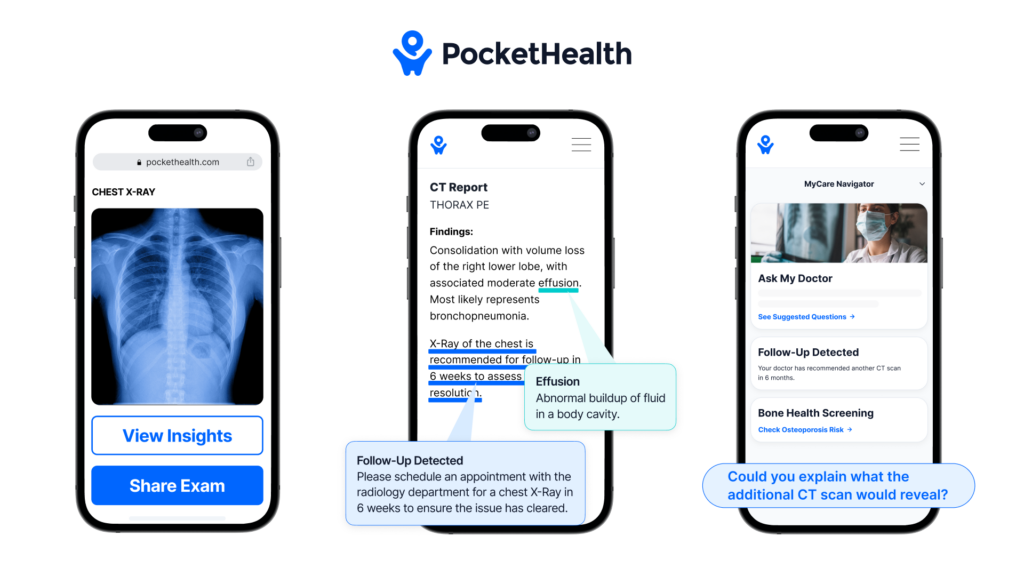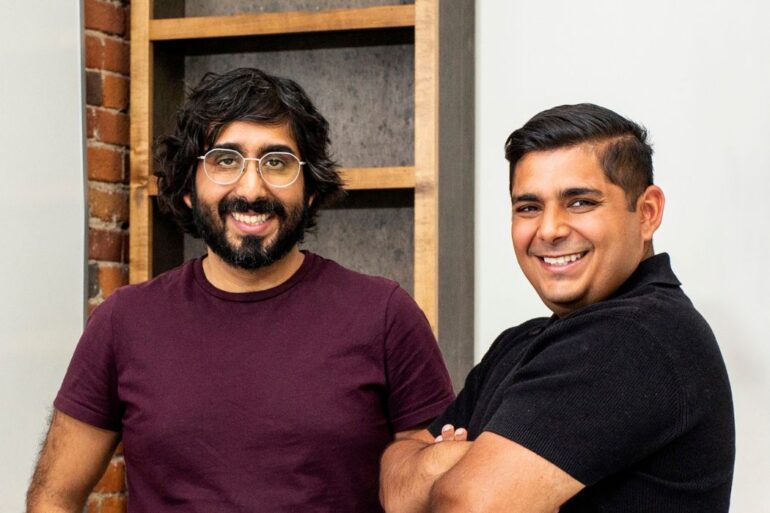Eight years ago, PocketHealth set out to build an easier way for patients and healthcare providers to access and share diagnostic images than CD-ROMs and legacy solutions.
Today, the Toronto-based startup’s software not only gives over 1.5 million people at over 650 hospitals and imaging centres across North America control over their medical images, but it also helps those patients make sense of those images using artificial intelligence (AI).
“We want to get PocketHealth in front of every patient and every provider in North America.”
Since closing its Series A round, the latter has been a key focus for PocketHealth. Over the past two years, the company has undergone a product evolution, rolling out new AI-powered tools aimed at enabling patients to understand and act on their medical images and helping providers operate more efficiently and better engage and retain patients—while also building a presence across the United States (US).
With $45 million CAD ($33 million USD) in fresh Series B funding, PocketHealth’s plan remains the same: to continue investing in AI, product development, and expanding its footprint across Canada and the US. To support these efforts, the startup plans to double the size of its 110-person workforce in the next two years.
“We want to get PocketHealth in front of every patient and every provider in North America,” PocketHealth co-founder and CEO Rishi Nayyar told BetaKit in an interview. “We don’t see this problem solved and we don’t see an incumbent that’s in our way … I think that’s rare in a market that’s as large as healthcare.”
PocketHealth’s all-equity Series B round, which closed in early March, was led by Round13 Capital with support from fellow new investors Deloitte Ventures and Samsung Next and existing backers, healthcare investor Questa Capital and AI-focused Radical Ventures. It brings PocketHealth’s total equity funding to $75 million CAD.
The startup’s app allows patients to securely access, store, and analyze their own medical image records, including X-rays, ultrasounds, CT scans, and MRIs, and share them with healthcare providers. PocketHealth, which describes itself as “the world’s first patient-centric image-sharing platform,” was founded by Citigroup alum Rishi Nayyar and his brother, former Google software engineer and PocketHealth CTO Harsh Nayyar.
Toronto’s Round13 reached out to PocketHealth after becoming interested in “patient-centric” business models and the use of AI in Canadian healthcare. “We were incredibly impressed with just the quality of the management team and the business that they had built,” Round13 principal Miranda Ferris, who is joining PocketHealth’s board, told BetaKit in an interview.
RELATED: PocketHealth secures $20 million CAD to put medical records in US patients’ pockets
Round13 managing partner Brahm Klar told BetaKit that the Series B round had “completely clean terms” and no structure. Rishi Nayyar and Klar declined to share PocketHealth’s latest valuation, which Klar claimed came at “a significant premium” to its $20-million Series A financing despite challenging market conditions. Rishi Nayyar declined to disclose whether the funding included any secondary capital. For his part, Klar emphasized that the Series B was a “growth round of financing.”
Klar has been impressed by PocketHealth’s progress to date. “In Canada, it’s become the market-leading solution by a wide margin and it’s built a really nice beachhead into the US,” he said, also describing the startup’s approach to balancing growth and sustainability as “hugely appealing” to Round13, which hopes to help PocketHealth scale to the next level.
From the early days, Klar said the Nayyar brothers have been “very pragmatic and very logical about setting their business up to succeed in a variety of market conditions, not just in perfect market conditions.” Ferris said the pair, which bootstrapped PocketHealth for its first four years of existence, have been thoughtful about their financing strategy and cash management.

According to Rishi Nayyar, unlike many of its Canadian tech peers, PocketHealth has never made layoffs or needed to “rationalize” its cost structure due to macroeconomic conditions.
During the venture capital boom, Rishi Nayyar claimed PocketHealth hired more slowly than many other firms. Sustainability has been a priority dating back to its bootstrapping days, especially since PocketHealth is providing “an essential service,” Harsh Nayyar told BetaKit.
“We’re a bit agnostic to what’s happening in the tech market,” said Rishi Nayyar. “We’re very sensitive to what’s happening in the healthcare market, and the last few years have not been great years for the US healthcare market.”
Rishi Nayyar noted that ongoing labour shortages have impacted healthcare service costs at the same time that COVID-19 spending has dried up. In this context, providers have “raised the bar for new technology,” he said, noting that healthcare organizations “don’t buy point solutions anymore” but platforms that solve more than one problem.
The CEO claimed PocketHealth saw this shift coming and invested in ensuring its platform was more than a “one-trick pony” or a “widget.” So far, this work has paid off. Rishi Nayyar declined to disclose the company’s annual revenue, but noted that PocketHealth’s customer retention has remained strong, the startup has seen three times as many patients signing up to its platform monthly on a year-over-year basis and added over 100 hospitals and imaging centres to its network in the past 12 months despite a challenging market.
“We’re not that scrappy upstart anymore.”
Rishi Nayyar, PocketHealth
Klar noted that across the B2B software landscape, Round13 is seeing that “customers want fewer providers to do more for them.” He described PocketHealth’s B2B2C model—which involves selling and offering value to patients and providers alike—as “very special.”
According to Radical senior principal Sanjana Basu, one of the reasons that Radical first invested and then doubled down on the company was the “data and distribution moat” PocketHealth has built. Basu told BetaKit that she has seen many healthcare AI companies die in the process of acquiring data and distribution.
“Pocket Health has both of those … They’re able to deploy AI products into a large customer base [and] they have such a strong, intimate understanding of both the providers and the patients that they’ll be able to deploy products that actually work,” said Basu.
Today, PocketHealth caters to clients across Canada and the US and a list of major health systems and outpatient imaging groups that include the University Health Network, Southern Illinois Healthcare, UofL Health, Universal Health Services, and Radiology Partners, among others.
Rishi Nayyar said there is still little competition in the space PocketHealth serves. “This isn’t an area that attracts a lot of innovation or investment,” he claimed. What has changed however is PocketHealth, which now claims to be the largest team focused solely on image exchange in North America. “We’re not that scrappy upstart anymore.”
Feature image courtesy PocketHealth.

